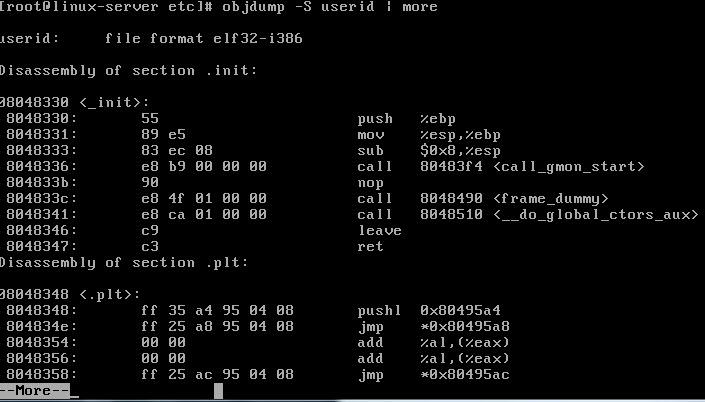Objdump is a program that displays information about inputted object files. The object file that is created when code is compiled is an ELF(Executable and Linkable Format) or as we will see it, “a.out”. We can take this object file and use Objdump to view the programs object code. You should use otool because objdump is a binutils tool for the ELF binary format on Linux and most other UNIX systems. Otool is the the disassembler for MacOS's Mach-O binary format. Type $ man otool for instructions on use. This program performs a similar function to objdump but it goes into more detail and it exists independently of the BFD library, so if there is a bug in BFD then readelf will not be affected. The long and short forms of options, shown here as alternatives, are equivalent. At least one option besides ‘-v’ or ‘-H’ must be given. Linux objdump command The objdump command in Linux, as the name suggests, displays information from object files. Following is the tool's syntax: objdump OPTIONS objfile.
Download PE objdump for free. Tool to find symbols in windows Library or Executable. It reads windows Portable Executable file format.

- DESCRIPTION
Binutils::Objdump - Perl interface to Binutils objdump
objdump displays information about one or more object files. The options control what particular information to display. This information is mostly useful to programmers who are working on the compilation tools, as opposed to programmers who just want their program to compile and work.
This module provides wrappers for the objdump output information parts, specified by special labels. To each part correspond a special wrapper, which can be extended by your own.

The script odasm is an example of disassembler based on Binutils::Objdump module.
Functions
Sets the new path to objdump if $path defined. Returns current path to the objdump executeable file. By default this path will be defined automatically, but if you have another location for it, you may change it.
Builds a new string of options if $optstr defined. Returns options for objdump in string format.
For example, options can be taken from @ARGV.
Executes objdump with string of options objdumpopt() and object files @objfiles, that have to be examinated. Returns the whole information about one or more object files.
By default, if none of object files will not be set, will be used default object file a.out from the current location.
Defines a special wrapper &wrapper for the correspond label LABEL. Notice, that default wrapper will not be replaced, and so, can be used.
When a label appears, the following lines will be saved till the next matched label. Then this lines will be passed to appropriate wrappers. Be carefull with default labels (if some label includes another, they will be merged).
Default wrapper for dynamic symbol table. Returns lines.

Default wrapper for summary information from the section headers of the object file. Returns lines.
Default wrapper for symbol table entries of the file. Returns lines.
Default wrapper for dynamic relocation entries of the file. Returns lines.
Default wrapper for contents of section $section. Returns lines for correspond section.
How To Use Objdump
Default wrapper for disassembly of section $section. Returns lines for correspond section.
Objdump Output
Exports
By default will be exported objdump, objdumpopt and objdumpwrap. The following tags can be used to selectively import functions defined in this module:
Alexander Sviridenko, <oleks.sviridenko@gmail.com>
Objdump -f
Slade Maurer, <slade@computer.org>
The Binutils::Objdump module is Copyright (c) 2009, 2011 Slade Maurer, Alexander Sviridenko. All rights reserved.
Objdump Download
You may distribute under the terms of either the GNU General Public License or the Artistic License, as specified in the Perl 5.10.0 README file.